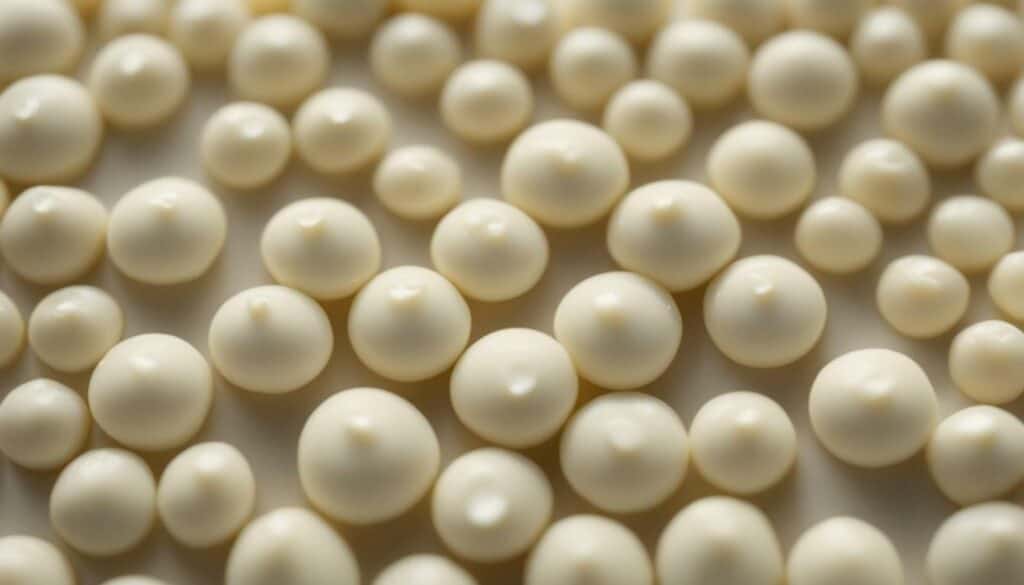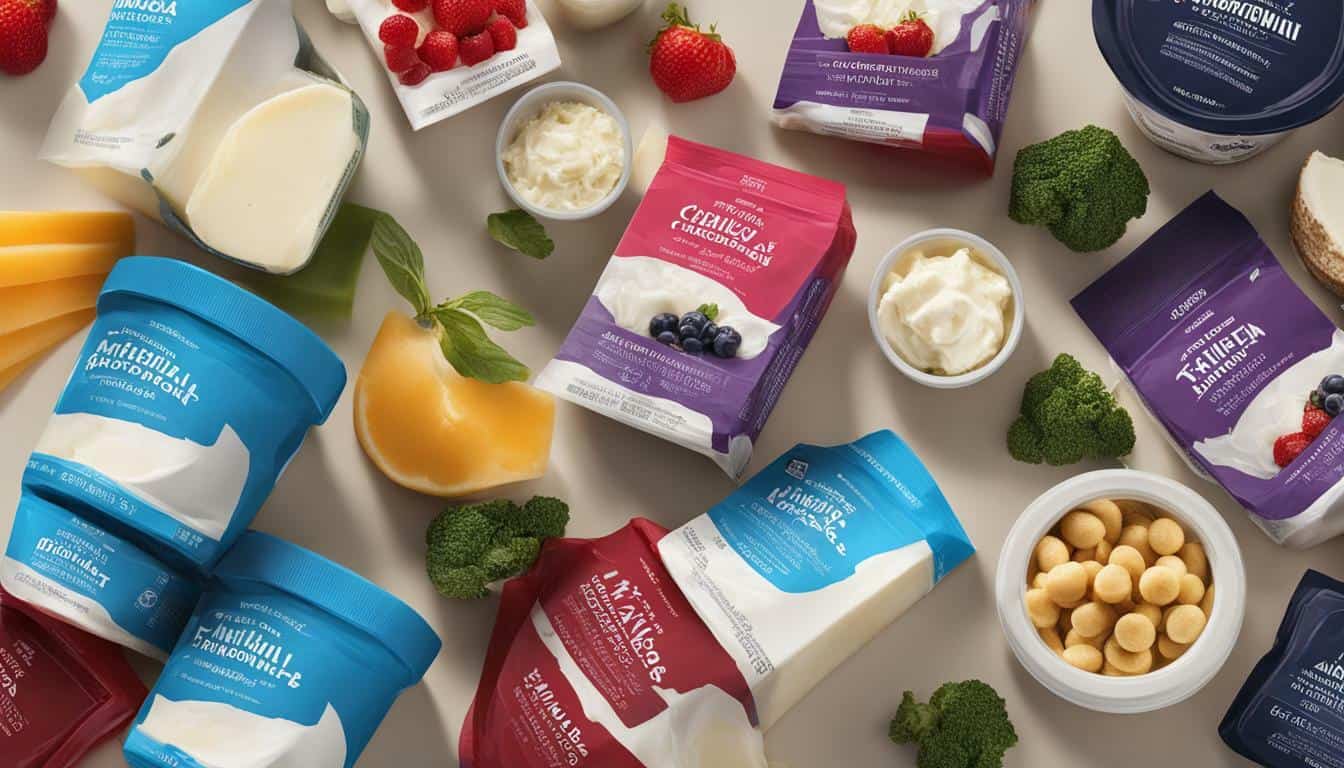When it comes to understanding the nutrition of Philadelphia Cream Cheese, there are essential facts and benefits to uncover. Whether you’re a fan of this creamy delight from Philadelphia or simply curious about its nutritional composition, this article will provide you with all the information you need.
- Philadelphia Cream Cheese Original contains 357 calories, 36g of total fat, and 7g of protein per serving of 100g.
- Cream cheese is low in nutrients but can be a lower-fat and lower-calorie alternative to butter.
- Neufchatel cheese is a lower-fat alternative to cream cheese.
- Cream cheese should be tightly sealed and refrigerated for proper storage.
- Greek cream cheese is a higher-protein, lower-fat option.
The Nutritional Composition of Philadelphia Cream Cheese
Philadelphia Cream Cheese, Original, is a popular choice for spreads, dips, and desserts. Each 100g serving of Philadelphia Cream Cheese Original contains 357 calories, 36g of total fat, 21g of saturated fat, 107mg of cholesterol, 393mg of sodium, 2g of total carbohydrates, and 7g of protein. It also provides small amounts of vitamins A, D, and C, calcium, iron, and potassium.
Regular cream cheese, on the other hand, contains 50.8 calories per tablespoon and has 5g of fat, 0.8g of carbohydrates, and 0.9g of protein. In addition to these macronutrients, cream cheese also provides vitamins A and K, folate, choline, calcium, phosphorus, magnesium, potassium, sodium, and trace amounts of selenium.
While cream cheese may be low in nutrients, it can be a suitable alternative to butter, as it is lower in fat and calories. However, it is important to note that flavored varieties of cream cheese may contain added sugar and additional calories. It is also not suitable for individuals with dairy or lactose intolerance.
Key Takeaways:
- Philadelphia Cream Cheese Original contains 357 calories, 36g of total fat, and 7g of protein per serving of 100g.
- Regular cream cheese provides vitamins A and K, folate, choline, calcium, phosphorus, magnesium, potassium, sodium, and trace amounts of selenium.
- Cream cheese can be a lower-fat and lower-calorie alternative to butter.
The Nutritional Composition of Philadelphia Cream Cheese
Let’s take a closer look at the calorie count and nutritional value of Philadelphia Cream Cheese. This creamy delight from Philadelphia is not only delicious but also offers some essential nutrients. Each serving of 100g contains 357 calories, making it a relatively high-calorie option. It is important to keep these calorie values in mind when incorporating cream cheese into your diet.
In terms of fat content, Philadelphia Cream Cheese contains 36g of total fat, with 21g being saturated fat. While saturated fat should be consumed in moderation, it is worth noting that cream cheese is a significant source of this type of fat. It also contains 107mg of cholesterol and 393mg of sodium per serving.
On the other hand, Philadelphia Cream Cheese provides 2g of total carbohydrates and 7g of protein. While it may not be a significant source of these nutrients, it can still contribute to your overall intake. Additionally, it contains small amounts of vitamins A, D, and C, as well as calcium, iron, and potassium.
| Nutrient | Amount per Serving (100g) |
|---|---|
| Calories | 357 |
| Total Fat | 36g |
| Saturated Fat | 21g |
| Cholesterol | 107mg |
| Sodium | 393mg |
| Total Carbohydrates | 2g |
| Protein | 7g |

It is important to note that regular cream cheese contains approximately 50.8 calories per tablespoon, with 5g of fat, 0.8g of carbohydrates, and 0.9g of protein. While it may have a slightly lower calorie content, regular cream cheese offers similar nutritional components as Philadelphia Cream Cheese. Both options provide vitamins A and K, folate, choline, calcium, phosphorus, magnesium, potassium, sodium, and trace amounts of selenium.
Although cream cheese may not be the most nutrient-dense food, it can still be enjoyed in moderation as part of a balanced diet. It can serve as a lower-fat and lower-calorie alternative to butter, making it a versatile ingredient in various recipes. However, it’s important to be mindful of flavored varieties that may contain added sugar and calories. It’s also worth noting that cream cheese is not suitable for those with dairy or lactose intolerance.
Neufchatel Cheese: A Lower-Fat Alternative
For individuals looking for a lower-fat alternative to cream cheese, Neufchatel cheese is an excellent option. It contains only 2.5g of fat per tablespoon, making it a healthier choice for those watching their fat intake. Neufchatel cheese is made from milk, while traditional cream cheese is made from both milk and cream, explaining the difference in fat content.
When storing cream cheese, it’s essential to seal it tightly and refrigerate it to maintain its freshness and quality. If the cream cheese is too hard to spread, you can soften it by leaving it at room temperature or gently pressing it with a roller or your hand. For those seeking a higher-protein, lower-fat alternative, Greek cream cheese is also available.
Macronutrients in Cream Cheese
Cream cheese contains various macronutrients that play a role in its nutritional makeup. Let’s take a closer look at these components and their significance in our diet.
One tablespoon of regular cream cheese provides approximately 50.8 calories, 5g of fat, 0.8g of carbohydrates, and 0.9g of protein. The main macronutrient found in cream cheese is fat, which contributes to its creamy texture and rich flavor. While cream cheese is not particularly high in protein or carbohydrates, it can still be a part of a balanced diet when consumed in moderation.
It’s important to note that cream cheese is also a source of vitamins and minerals. It contains vitamins A and K, which are essential for maintaining healthy vision, bone health, and blood clotting. Cream cheese also provides beneficial minerals such as calcium, phosphorus, magnesium, and potassium, which are important for a variety of bodily functions.
| Nutrient | Amount per tablespoon (Regular Cream Cheese) |
|---|---|
| Calories | 50.8 |
| Total Fat | 5g |
| Carbohydrates | 0.8g |
| Protein | 0.9g |
While cream cheese is not particularly high in protein or carbohydrates, it can still be a part of a balanced diet when consumed in moderation.
When considering cream cheese alternatives, neufchatel cheese is a popular choice. This cheese has a similar texture and taste to cream cheese but contains less fat. With only 2.5g of fat per tablespoon, neufchatel cheese offers a lower-fat option for those looking to reduce their fat intake while still enjoying a creamy spread. Neufchatel cheese is made from milk, whereas traditional cream cheese is made from a combination of milk and cream.
To summarize, cream cheese is a rich source of fat and provides small amounts of carbohydrates and protein. It also contains vitamins A and K, along with important minerals like calcium. Neufchatel cheese offers a lower-fat alternative to regular cream cheese. Incorporating cream cheese into a balanced diet can be a delicious way to enjoy its unique flavor and texture.

While cream cheese may not be packed with nutrients, it does offer some potential health benefits. This versatile spread contains essential vitamins and minerals, making it a flavorful addition to your meals and snacks.
- Calcium: Cream cheese is a good source of calcium, which is important for maintaining strong bones and teeth. A 100g serving of Philadelphia Cream Cheese Original provides about 72% of the recommended daily intake of calcium.
- Vitamin A: Cream cheese contains small amounts of vitamin A, which plays a crucial role in supporting healthy vision, immune function, and cell growth.
- Protein: Cream cheese is a source of protein, providing essential amino acids that are necessary for building and repairing tissues in the body.
However, it is worth noting that cream cheese should be consumed in moderation due to its high saturated fat and calorie content. Excessive consumption may contribute to weight gain and increased risk of heart disease. It is important to balance your intake with other nutritious foods and incorporate it into a well-rounded diet.

When choosing cream cheese, opt for lower-fat varieties like Neufchatel cheese or Greek cream cheese, which offer similar taste and texture with reduced fat content. Neufchatel cheese is made from milk and has a lower fat content than traditional cream cheese. Greek cream cheese, on the other hand, is higher in protein and lower in fat, making it a healthier option.
To store cream cheese, ensure it is sealed tightly and refrigerated at all times. It can be softened by leaving it at room temperature or by gently pressing it with a roller or your hand. Remember to check the expiration date and discard any cream cheese that appears spoiled or has an off smell.
Summary:
Cream cheese offers potential health benefits due to its calcium, vitamin A, and protein content. However, it should be consumed in moderation due to its high saturated fat and calorie content. Opt for lower-fat alternatives like Neufchatel cheese or Greek cream cheese for a healthier option. Store cream cheese properly and check for freshness before consuming.
Cream Cheese Ingredients
The ingredients used to make Philadelphia Cream Cheese play a crucial role in its overall composition. This creamy and indulgent spread is crafted with high-quality ingredients to ensure a rich and satisfying flavor.
The key ingredients in Philadelphia Cream Cheese include:
- Pasteurized milk and cream: These dairy products provide the creamy and smooth texture that cream cheese is known for.
- Salt: Salt is added to enhance the flavor and act as a preservative.
- Carob bean gum: This natural thickening agent helps to stabilize the cream cheese and improve its texture.
- Cheese culture: Cheese cultures are added to the cream cheese mixture to help develop its unique flavor profile.
Together, these ingredients come together to create the velvety and tangy taste that Philadelphia Cream Cheese is loved for. It is important to note that this is the composition of Philadelphia Cream Cheese Original, and flavored varieties may contain additional ingredients for various tastes.

Comparison: Philadelphia Cream Cheese vs. Neufchatel Cheese
While Philadelphia Cream Cheese is a popular choice, there are alternative options available in the market. One such option is Neufchatel cheese, which is a lower-fat alternative to cream cheese. Neufchatel cheese is made from milk, while traditional cream cheese is made from milk and cream. It contains approximately 2.5g of fat per tablespoon, making it a lighter choice for those who are conscious of their fat intake.
When it comes to storing cream cheese, it is important to seal the package tightly and keep it refrigerated. This will help maintain its freshness and prevent bacterial growth. If the cream cheese is too firm, it can be softened by leaving it at room temperature or by gently pressing it with a roller or hand. Additionally, Greek cream cheese is a higher-protein, lower-fat option for those looking for a healthier alternative.
In conclusion, understanding the ingredients used in cream cheese is essential in appreciating its unique taste and texture. Philadelphia Cream Cheese, with its carefully selected ingredients, offers a rich and indulgent experience for cream cheese lovers. Whether you choose the original variety or explore alternatives like Neufchatel cheese, cream cheese remains a versatile spread that can be enjoyed in a variety of sweet and savory dishes.
Cream Cheese Serving Size
To properly include cream cheese in your diet, it’s important to know the appropriate serving size. While cream cheese is delicious and creamy, it is also high in calories and fat, so portion control is key. The recommended serving size for cream cheese is typically 1 tablespoon, which is equivalent to about 14 grams. This small portion allows you to enjoy the flavor and creaminess of cream cheese without overdoing it on calories and fat.
Using cream cheese in moderation can be a tasty addition to a variety of dishes. Whether spread on a bagel, used as a dip for vegetables, or incorporated into recipes like cheesecakes and frostings, it adds a rich and creamy texture. However, it’s important to be mindful of the serving size to avoid consuming excessive amounts of calories and fat.
Table: Cream Cheese Nutrition Comparison
| Calories | Total Fat (g) | Carbohydrates (g) | Protein (g) | |
|---|---|---|---|---|
| Regular Cream Cheese (1 tablespoon) | 50.8 | 5 | 0.8 | 0.9 |
| Neufchatel Cheese (1 tablespoon) | 45 | 2.5 | 0.8 | 1.4 |
| Philadelphia Cream Cheese Original (1oz/28g) | 100 | 10 | 1 | 2 |
As you can see from the table above, regular cream cheese and Neufchatel cheese have similar serving sizes and provide comparable amounts of calories, fat, and carbohydrates. However, Neufchatel cheese is lower in fat, making it a healthier choice for those looking to reduce their fat intake.
Remember, while cream cheese can be enjoyed in moderation, it’s always important to balance it with a variety of other nutritious foods as part of a well-rounded diet. Understanding the appropriate serving size helps ensure that you can savor the deliciousness of cream cheese without going overboard on calories and fat.
If you’re looking for alternatives to traditional cream cheese, you might consider these options:
- Neufchatel Cheese: Neufchatel cheese is a lower-fat alternative to cream cheese with only 2.5g of fat per tablespoon. It is made from milk, while traditional cream cheese is made from milk and cream.
- Greek Cream Cheese: Greek cream cheese is a higher-protein, lower-fat option. It provides a creamy texture and tangy flavor that is similar to traditional cream cheese, but with added health benefits.
These alternatives offer different nutritional profiles and can be used in various recipes. Neufchatel cheese is a great option for those looking to reduce their fat intake, while Greek cream cheese is a good choice for individuals seeking a higher protein content.
When using these alternatives, it’s important to note that the taste and consistency may differ slightly from traditional cream cheese. However, they can still be enjoyed in a variety of dishes, such as spreads, dips, and desserts.
| Alternative | Fat Content per Tablespoon |
|---|---|
| Neufchatel Cheese | 2.5g |
| Greek Cream Cheese | Varies, but typically lower than traditional cream cheese |
By exploring these cream cheese alternatives, you can discover new flavors and adapt your favorite recipes to meet your dietary preferences and health goals.
Proper storage and preparation are key when it comes to enjoying cream cheese. To ensure its freshness and longevity, cream cheese should be tightly sealed and refrigerated at all times. This will help prevent any bacterial growth and maintain its creamy texture.
When it comes to preparing cream cheese, there are a few options. If the cream cheese is too firm to spread, you can bring it to room temperature by leaving it out for about 30 minutes. Another method is to place the sealed package in warm water for a few minutes to soften it. Alternatively, you can gently press the cream cheese with a roller or your hand to soften it.

For those looking for a lower-fat and lower-calorie alternative, Neufchatel cheese is a great option. It has a similar taste and texture to cream cheese but with less fat. Neufchatel cheese is made from milk, while traditional cream cheese is made from milk and cream.
If you prefer a higher-protein, lower-fat option, Greek cream cheese is worth considering. This type of cream cheese is made using Greek yogurt, resulting in a creamier and tangier flavor. It can be a nutritious addition to your meals or snacks.
| Cream Cheese Type | Calories (per tablespoon) | Total Fat (g) | Carbohydrates (g) | Protein (g) |
|---|---|---|---|---|
| Regular Cream Cheese | 50.8 | 5 | 0.8 | 0.9 |
| Neufchatel Cheese | 45 | 2.5 | 0.4 | 0.6 |
| Greek Cream Cheese | 50 | 4 | 1 | 2 |
Remember that while cream cheese can be a tasty addition to your recipes, it is low in nutrients and may not offer significant health benefits. It’s important to consume it in moderation and be mindful of any added sugars or flavors that can increase its calorie content.
Philadelphia Cream Cheese Original Nutrition Facts
Let’s take a closer look at the nutrition facts of Philadelphia Cream Cheese Original. Per serving of 100g, it contains 357 calories, 36g of total fat, 21g of saturated fat, 107mg of cholesterol, 393mg of sodium, 2g of total carbohydrates, and 7g of protein. It also contains small amounts of vitamins A, D, and C, calcium, iron, and potassium. The ingredients include pasteurized milk and cream, salt, carob bean gum, and cheese culture.
Regular cream cheese, on the other hand, contains 50.8 calories per tablespoon and has 5g of fat, 0.8g of carbohydrates, and 0.9g of protein. In addition to these macronutrients, cream cheese also provides a range of micronutrients, including vitamins A and K, folate, choline, calcium, phosphorus, magnesium, potassium, sodium, and trace amounts of selenium. It is important to note that the nutritional composition may vary slightly depending on the brand or specific product.
While cream cheese may not be high in nutrients, it can serve as a lower-fat and lower-calorie alternative to butter. However, flavored cream cheese varieties may contain added sugar and additional calories. It is also important to note that cream cheese is not suitable for those with dairy or lactose intolerance, as it contains milk and cream. If you are looking for a healthier alternative, Neufchatel cheese is a lower-fat option with only 2.5g of fat per tablespoon.
When it comes to storing cream cheese, it is best to seal it tightly and keep it refrigerated. If you need to soften it for spreading, you can leave it at room temperature or gently press it with a roller or your hand. Another alternative is Greek cream cheese, which is higher in protein and lower in fat compared to regular cream cheese.
| Nutrition Facts | Per Serving (100g) |
|---|---|
| Calories | 357 |
| Total Fat | 36g |
| Saturated Fat | 21g |
| Cholesterol | 107mg |
| Sodium | 393mg |
| Total Carbohydrates | 2g |
| Protein | 7g |
Philadelphia Cream Cheese Original also provides small amounts of vitamins A and C, calcium, and iron. With its creamy texture and rich flavor, it can be a versatile ingredient in both sweet and savory dishes. Whether you spread it on a bagel or use it as a base for cheesecake, be mindful of portion sizes and incorporate it as part of a balanced diet.
Conclusion
After diving into the nutrition information of Philadelphia Cream Cheese, it’s clear that understanding its composition and potential health benefits is essential for informed consumption.
Philadelphia Cream Cheese Original, per serving of 100g, contains 357 calories, 36g of total fat, 21g of saturated fat, 107mg of cholesterol, 393mg of sodium, 2g of total carbohydrates, and 7g of protein. It also contains small amounts of vitamins A, D, and C, calcium, iron, and potassium. The ingredients include pasteurized milk and cream, salt, carob bean gum, and cheese culture.
Regular cream cheese, on the other hand, contains 50.8 calories per tablespoon and has 5g of fat, 0.8g of carbohydrates, and 0.9g of protein. It also provides vitamins A and K, folate, choline, calcium, phosphorus, magnesium, potassium, sodium, and trace amounts of selenium.
Cream cheese itself is low in nutrients and has little direct health benefits. However, it can serve as a lower-fat and lower-calorie alternative to butter. It’s important to note that flavored varieties may contain added sugar and calories. Additionally, cream cheese is not suitable for those with dairy or lactose intolerance.
For those looking for alternatives, Neufchatel cheese is a lower-fat option with 2.5g of fat per tablespoon. It is made from milk, while traditional cream cheese is made from milk and cream. Greek cream cheese is another option, offering higher protein content and lower fat content.
When storing cream cheese, ensure it is tightly sealed and refrigerated. If you need to soften it, you can leave it at room temperature or press it gently with a roller or your hand. Overall, Philadelphia Cream Cheese Original provides 100 calories per ounce, with 10g of fat, 6g of saturated fat, 30mg of cholesterol, 110mg of sodium, and 1g of total sugars. It also contains small amounts of vitamins A and C, calcium, and iron. The ingredients remain the same: pasteurized milk and cream, salt, carob bean gum, and cheese culture.
FAQ
Q: What is the nutritional composition of Philadelphia Cream Cheese?
A: Philadelphia Cream Cheese, Original, contains 357 calories, 36g of total fat, 21g of saturated fat, 107mg of cholesterol, 393mg of sodium, 2g of total carbohydrates, and 7g of protein per 100g serving.
Q: What are the macronutrients in cream cheese?
A: Cream cheese contains 5g of fat, 0.8g of carbohydrates, and 0.9g of protein per tablespoon.
Q: Are there any health benefits associated with cream cheese?
A: Cream cheese is low in nutrients but can be a lower-fat and lower-calorie alternative to butter. However, flavored varieties may contain added sugar and calories.
Q: What are the ingredients in Philadelphia Cream Cheese?
A: The ingredients include pasteurized milk and cream, salt, carob bean gum, and cheese culture.
Q: How should cream cheese be stored and prepared?
A: Cream cheese should be tightly sealed and refrigerated. It can be softened by leaving it at room temperature or by pressing it with a roller or hand.
Q: Are there any alternatives to traditional cream cheese?
A: Neufchatel cheese is a lower-fat alternative to cream cheese made from milk. Greek cream cheese is a higher-protein, lower-fat option.
Q: What are the specific nutrition facts of Philadelphia Cream Cheese Original?
A: Philadelphia Cream Cheese Original contains 100 calories, 10g of fat, 6g of saturated fat, 30mg of cholesterol, 110mg of sodium, and 1g of total sugars per ounce.
Is Presto Pasta a Healthy Option for Nutritional Needs?
When it comes to meeting nutritional needs, it’s essential to consider presto pasta nutrition facts. While pasta itself provides important carbohydrates, vitamins, and minerals, the nutrition profile can vary depending on the ingredients and preparation methods. Opting for whole grain pasta and pairing it with lean proteins and vegetables can make it a healthier option to meet your dietary requirements.
Source Links
- https://www.recipal.com/ingredients/7638-nutrition-facts-calories-protein-carbs-fat-philadelphia-cream-cheese-original
- https://www.verywellfit.com/cream-cheese-nutrition-facts-calories-and-health-benefits-4111288
- https://www.cashwise.com/displayproductdetail?productId=3925&facilityId=3045&locationCode=productpage_bestsellers





Leave a Reply